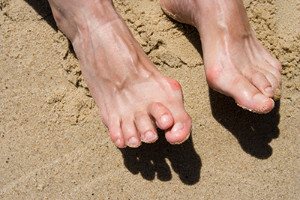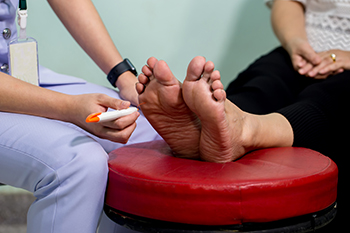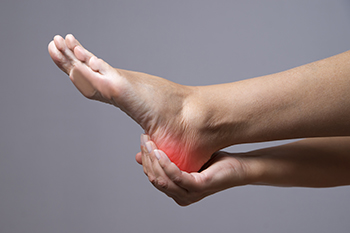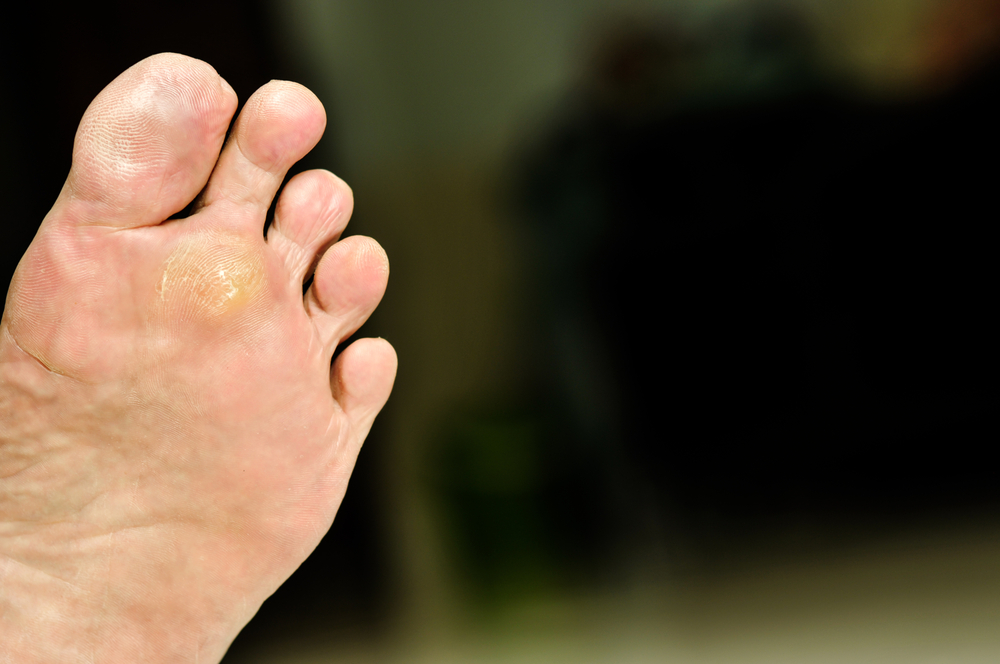August 2023
Dealing With Overlapping Toes

An overlapping toe, whether in adults or newborns, is a common condition with varying causes. In adults, overlapping toes can result from heredity, ill fitting shoes, and different forms of arthritis, including rheumatoid. Biomechanics, such as overpronation or tight calf muscles are other possible causes. Foot conditions, such as bunions, flat feet, hammer toes, and high arches, may cause overlapping toes to develop. Factors such as age and foot injuries can worsen this condition. Overlapping toes can also affect newborns, typically involving the pinky toe overlapping the fourth toe. Genetics and fetal position in the womb can contribute to this condition too. Complications of overlapping toes include pain, corns, calluses, bursitis, and metatarsalgia. Prompt treatment is essential to prevent these complications and to ensure proper alignment of the toes. Non surgical measures include proper shoe fitting, toe separators, and maintaining a healthy body weight. In some cases, surgery may be an option. If you are experiencing overlapping toes, it is suggested that you make an appointment with a podiatrist for an accurate diagnosis and personalized treatment plan.
Toe pain can disrupt your daily activities. If you have any concerns, contact Dr. Anna Petrov of Family Foot & Ankle Care. Our doctor can provide the care you need to keep you pain-free and on your feet.
What Causes Toe Pain?
Most severe toe pain is caused due to a sports injury, trauma from dropping something heavy on the toe, or bumping into something rigid. Other problems can develop over time for various reasons.
Toe pain can be caused by one or more ailments. The most common include:
- Trauma
- Sports injury
- Wearing shoes that are too tight
- Arthritis
- Gout
- Corns and calluses
- Hammertoe
- Bunions
- Blisters
- Ingrown toenails
- Sprains
- Fractures (broken bones)
- Dislocations
When to See a Podiatrist
- Severe pain
- Persistent pain that lasts more than a week
- Signs of infection
- Continued swelling
- Pain that prevents walking
Diagnosis
In many cases the cause of toe pain is obvious, but in others, a podiatrist may want to use more advanced methods to determine the problem. These can range from simple visual inspections and sensation tests to X-rays and MRI scans. Prior medical history, family medical history, and any recent physical traumatic events will all be taken into consideration for a proper diagnosis.
Treatment
Treatments for toe pain and injuries vary and may include shoe inserts, padding, taping, medicines, injections, and in some cases, surgery. If you believe that you have broken a toe, please see a podiatrist as soon as possible.
If you have any questions please feel free to contact one of our offices located in Wheeling and Chicago, IL . We offer the newest diagnostic tools and technology to treat your foot and ankle needs.
Untangling the Underlying Causes of Neuropathy

Neuropathy, a complex, and often perplexing condition can cast a shadow over the quality of one’s life. This ailment stems from damage to the peripheral nerves, which can result in a range of uncomfortable sensations, including numbness, tingling, and pain. Symptoms are often noticed in the feet, possibly causing difficulty in walking. Various underlying factors contribute to neuropathy's onset. Diabetes, a common cause, can expose nerves to prolonged high blood sugar levels, triggering damage. Chronic alcohol abuse can lead to nutritional deficiencies, impacting nerve health. Autoimmune diseases, infections such as Lyme disease, and certain medications can also contribute to developing neuropathy. Additionally, genetics play a role in predisposition to neuropathy. Understanding these triggers is essential for effective management and treatment. By addressing the root causes, individuals can take strides toward alleviating symptoms and improving their overall well-being. If your feet begin to tingle or become numb, it is suggested that you confer with a podiatrist who can effectively diagnose and offer you the correct treatment techniques for neuropathy.
Neuropathy
Neuropathy can be a potentially serious condition, especially if it is left undiagnosed. If you have any concerns that you may be experiencing nerve loss in your feet, consult with Dr. Anna Petrov from Family Foot & Ankle Care. Our doctor will assess your condition and provide you with quality foot and ankle treatment for neuropathy.
What Is Neuropathy?
Neuropathy is a condition that leads to damage to the nerves in the body. Peripheral neuropathy, or neuropathy that affects your peripheral nervous system, usually occurs in the feet. Neuropathy can be triggered by a number of different causes. Such causes include diabetes, infections, cancers, disorders, and toxic substances.
Symptoms of Neuropathy Include:
- Numbness
- Sensation loss
- Prickling and tingling sensations
- Throbbing, freezing, burning pains
- Muscle weakness
Those with diabetes are at serious risk due to being unable to feel an ulcer on their feet. Diabetics usually also suffer from poor blood circulation. This can lead to the wound not healing, infections occurring, and the limb may have to be amputated.
Treatment
To treat neuropathy in the foot, podiatrists will first diagnose the cause of the neuropathy. Figuring out the underlying cause of the neuropathy will allow the podiatrist to prescribe the best treatment, whether it be caused by diabetes, toxic substance exposure, infection, etc. If the nerve has not died, then it’s possible that sensation may be able to return to the foot.
Pain medication may be issued for pain. Electrical nerve stimulation can be used to stimulate nerves. If the neuropathy is caused from pressure on the nerves, then surgery may be necessary.
If you have any questions, please feel free to contact one of our offices located in Wheeling and Chicago, IL . We offer the newest diagnostic and treatment technologies for all your foot care needs.
Why Would My Heel Feel Numb?

Numerous factors can cause heel numbness. Common causes can include sitting with crossed legs or wearing tight shoes. Some cases may have more serious origins, such as diabetes, hypothyroidism, lupus, nerve compression, or an infection. Numbness may lead to difficulty in sensing touch, temperature, or it may be difficult to balance while walking. Additional symptoms can include tingling, weakness, and sometimes pain or swelling. Seeking medical attention is important, especially if numbness is severe or if it accompanies other symptoms that can include stroke indicators. Treatment depends on the underlying cause and may involve medication or alternative therapies. If simple fixes do not alleviate the numbness, it is strongly suggested that you consult a podiatrist for proper diagnosis and treatment.
Many people suffer from bouts of heel pain. For more information, contact Dr. Anna Petrov of Family Foot & Ankle Care. Our doctor can provide the care you need to keep you pain-free and on your feet.
Causes of Heel Pain
Heel pain is often associated with plantar fasciitis. The plantar fascia is a band of tissues that extends along the bottom of the foot. A rip or tear in this ligament can cause inflammation of the tissue.
Achilles tendonitis is another cause of heel pain. Inflammation of the Achilles tendon will cause pain from fractures and muscle tearing. Lack of flexibility is also another symptom.
Heel spurs are another cause of pain. When the tissues of the plantar fascia undergo a great deal of stress, it can lead to ligament separation from the heel bone, causing heel spurs.
Why Might Heel Pain Occur?
- Wearing ill-fitting shoes
- Wearing non-supportive shoes
- Weight change
- Excessive running
Treatments
Heel pain should be treated as soon as possible for immediate results. Keeping your feet in a stress-free environment will help. If you suffer from Achilles tendonitis or plantar fasciitis, applying ice will reduce the swelling. Stretching before an exercise like running will help the muscles. Using all these tips will help make heel pain a condition of the past.
If you have any questions please contact one of our offices located in Wheeling and Chicago, IL . We offer the newest diagnostic and treatment technologies for all your foot and ankle needs.
Heel Bone Pressure Injuries

Pressure injuries on the heel bone, also called heel pressure ulcers, result from prolonged pressure and friction. The heel is the second most common site for such injuries due to its small area bearing the weight of the lower extremities. People with immobility, diabetes, leg spasms, or impaired blood flow are more susceptible to these injuries, affecting their quality of life. Prevention and healing involve alleviating pressure by using supportive devices. Such injuries can lead to open wounds, blisters, or deep tissue damage, increasing the risk of infection. Treatment options include pressure relief, proper wound care, specialized cushioning or boots, and, in severe cases, surgery. Due to the complexity and potential complications of such foot wounds, if you suffer from this, it is suggested that you make an appointment with a podiatrist for care.
Wound care is an important part in dealing with diabetes. If you have diabetes and a foot wound or would like more information about wound care for diabetics, consult with Dr. Anna Petrov from Family Foot & Ankle Care. Our doctor will assess your condition and provide you with quality foot and ankle treatment.
What Is Wound Care?
Wound care is the practice of taking proper care of a wound. This can range from the smallest to the largest of wounds. While everyone can benefit from proper wound care, it is much more important for diabetics. Diabetics often suffer from poor blood circulation which causes wounds to heal much slower than they would in a non-diabetic.
What Is the Importance of Wound Care?
While it may not seem apparent with small ulcers on the foot, for diabetics, any size ulcer can become infected. Diabetics often also suffer from neuropathy, or nerve loss. This means they might not even feel when they have an ulcer on their foot. If the wound becomes severely infected, amputation may be necessary. Therefore, it is of the upmost importance to properly care for any and all foot wounds.
How to Care for Wounds
The best way to care for foot wounds is to prevent them. For diabetics, this means daily inspections of the feet for any signs of abnormalities or ulcers. It is also recommended to see a podiatrist several times a year for a foot inspection. If you do have an ulcer, run the wound under water to clear dirt from the wound; then apply antibiotic ointment to the wound and cover with a bandage. Bandages should be changed daily and keeping pressure off the wound is smart. It is advised to see a podiatrist, who can keep an eye on it.
If you have any questions, please feel free to contact one of our offices located in Wheeling and Chicago, IL . We offer the newest diagnostic and treatment technologies for all your foot care needs.
Reminder: When Was the Last Time...?
What Are Plantar Warts?

Plantar warts are small, rough growths on the sole of the feet caused by HPV, or the human papillomavirus, entering the skin through minor cuts or abrasions. These warts can be painful, especially when walking or standing. They may appear as single growths or in clusters. Over-the-counter treatments, like salicylic acid patches or gels, can be effective in gradually dissolving plantar warts over time. However, some cases are stubborn and necessitate professional intervention. If you or your child have a plantar wart that is painful or will not go away, it is suggested that you make an appointment with a podiatrist for treatment options that might include freezing the wart, laser therapy, or a minor surgical procedure to permanently remove it.
Plantar warts can be very uncomfortable. If you need your feet checked, contact Dr. Anna Petrov from Family Foot & Ankle Care. Our doctor will assist you with all of your foot and ankle needs.
About Plantar Warts
Plantar warts are the result of HPV, or human papillomavirus, getting into open wounds on the feet. They are mostly found on the heels or balls of the feet.
While plantar warts are generally harmless, those experiencing excessive pain or those suffering from diabetes or a compromised immune system require immediate medical care. Plantar warts are easily diagnosed, usually through scraping off a bit of rough skin or by getting a biopsy.
Symptoms
- Lesions on the bottom of your feet, usually rough and grainy
- Hard or thick callused spots
- Wart seeds, which are small clotted blood vessels that look like little black spots
- Pain, discomfort, or tenderness of your feet when walking or standing
Treatment
- Freezing
- Electric tool removal
- Laser Treatment
- Topical Creams (prescription only)
- Over-the-counter medications
To help prevent developing plantar warts, avoid walking barefoot over abrasive surfaces that can cause cuts or wounds for HPV to get into. Avoiding direct contact with other warts, as well as not picking or rubbing existing warts, can help prevent the further spread of plantar warts. However, if you think you have developed plantar warts, speak to your podiatrist. He or she can diagnose the warts on your feet and recommend the appropriate treatment options.
If you have any questions please feel free to contact one of our offices located in Wheeling and Chicago, IL . We offer the newest diagnostic and treatment technologies for all your foot and ankle needs.








